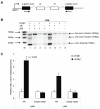The RNA helicase p68 is a novel androgen receptor coactivator involved in splicing and is overexpressed in prostate cancer
- PMID: 18829551
- PMCID: PMC2561211
- DOI: 10.1158/0008-5472.CAN-08-0932
The RNA helicase p68 is a novel androgen receptor coactivator involved in splicing and is overexpressed in prostate cancer
Abstract
The androgen receptor (AR) is a member of the nuclear steroid hormone receptor family and is thought to play an important role in the development of both androgen-dependent and androgen-independent prostatic malignancy. Elucidating roles by which cofactors regulate AR transcriptional activity may provide therapeutic advancement for prostate cancer (PCa). The DEAD box RNA helicase p68 (Ddx5) was identified as a novel AR-interacting protein by yeast two-hybrid screening, and we sought to examine the involvement of p68 in AR signaling and PCa. The p68-AR interaction was verified by colocalization of overexpressed protein by immunofluorescence and confirmed in vivo by coimmunoprecipitation in the PCa LNCaP cell line. Chromatin immunoprecipitation in the same cell line showed AR and p68 recruitment to the promoter region of the androgen-responsive prostate-specific antigen (PSA) gene. Luciferase reporter, minigene splicing assays, and RNA interference (RNAi) were used to examine a functional role of p68 in AR-regulated gene expression, whereby p68 targeted RNAi reduced AR-regulated PSA expression, and p68 enhanced AR-regulated repression of CD44 splicing (P = 0.008). Tyrosine phosphorylation of p68 was found to enhance coactivation of ligand-dependent transcription of AR-regulated luciferase reporters independent of ATP-binding. Finally, we observe increased frequency and expression of p68 in PCa compared with benign tissue using a comprehensive prostate tissue microarray (P = 0.003; P = 0.008). These findings implicate p68 as a novel AR transcriptional coactivator that is significantly overexpressed in PCa with a possible role in progression to hormone-refractory disease.
Figures






Similar articles
-
p68/DdX5 supports β-catenin & RNAP II during androgen receptor mediated transcription in prostate cancer.PLoS One. 2013;8(1):e54150. doi: 10.1371/journal.pone.0054150. Epub 2013 Jan 17. PLoS One. 2013. PMID: 23349811 Free PMC article.
-
Coupling transcription to RNA processing via the p68 DEAD box RNA helicase androgen receptor co-activator in prostate cancer.Biochem Soc Trans. 2008 Jun;36(Pt 3):546-7. doi: 10.1042/BST0360546. Biochem Soc Trans. 2008. PMID: 18482004 Review.
-
Investigation of androgen receptor-dependent alternative splicing has identified a unique subtype of lethal prostate cancer.Asian J Androl. 2023 May-Jun;25(3):296-308. doi: 10.4103/aja202263. Asian J Androl. 2023. PMID: 36259569 Free PMC article.
-
The RNA-binding and adaptor protein Sam68 modulates signal-dependent splicing and transcriptional activity of the androgen receptor.J Pathol. 2008 May;215(1):67-77. doi: 10.1002/path.2324. J Pathol. 2008. PMID: 18273831
-
The role of DEAD-box RNA helicase p68 (DDX5) in the development and treatment of breast cancer.J Cell Physiol. 2019 May;234(5):5478-5487. doi: 10.1002/jcp.26912. Epub 2018 Nov 11. J Cell Physiol. 2019. PMID: 30417346 Review.
Cited by
-
PDGF upregulates Mcl-1 through activation of β-catenin and HIF-1α-dependent signaling in human prostate cancer cells.PLoS One. 2012;7(1):e30764. doi: 10.1371/journal.pone.0030764. Epub 2012 Jan 20. PLoS One. 2012. PMID: 22276222 Free PMC article.
-
DDX5 resolves R-loops at DNA double-strand breaks to promote DNA repair and avoid chromosomal deletions.NAR Cancer. 2020 Sep;2(3):zcaa028. doi: 10.1093/narcan/zcaa028. Epub 2020 Sep 25. NAR Cancer. 2020. PMID: 33015627 Free PMC article.
-
Pleiotropic effects of p300-mediated acetylation on p68 and p72 RNA helicase.J Biol Chem. 2010 Oct 1;285(40):30443-52. doi: 10.1074/jbc.M110.143792. Epub 2010 Jul 27. J Biol Chem. 2010. PMID: 20663877 Free PMC article.
-
Single-nucleotide polymorphisms of stemness genes predicted to regulate RNA splicing, microRNA and oncogenic signaling are associated with prostate cancer survival.Carcinogenesis. 2018 Jul 3;39(7):879-888. doi: 10.1093/carcin/bgy062. Carcinogenesis. 2018. PMID: 29726910 Free PMC article.
-
Smad-mediated miRNA processing: a critical role for a conserved RNA sequence.RNA Biol. 2011 Jan-Feb;8(1):71-6. doi: 10.4161/rna.8.1.14299. Epub 2011 Jan 1. RNA Biol. 2011. PMID: 21289485 Free PMC article. Review.
References
-
- Ferlay J, Autier P, Boniol M, Heanue M, Colombet M, Boyle P. Estimates of the cancer incidence and mortality in Europe in 2006. Ann Oncol. 2007;18:581–92. - PubMed
-
- Gann PH. Interpreting recent trends in prostate cancer incidence and mortality. Epidemiology. 1997;8:117–20. - PubMed
-
- Feldman BJ, Feldman D. The development of androgen-independent prostate cancer. Nature Review Cancer. 2001;1:34–45. - PubMed
-
- Chen CD, Welsbie DS, Tran C, et al. Molecular determinants of resistance to antiandrogen therapy. Nature Medicine. 2004;10:33–9. - PubMed
-
- Chmelar R, Buchanan G, Need EF, Tilley W, Greenberg NM. Androgen receptor coregulators and their involvement in the development and progression of prostate cancer. International Journal of Cancer. 2007;120:719–33. - PubMed
Publication types
MeSH terms
Substances
Grants and funding
LinkOut - more resources
Full Text Sources
Other Literature Sources
Medical
Molecular Biology Databases
Research Materials
Miscellaneous

